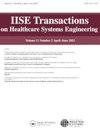远程icu的人员配置决策:专用资源vs灵活资源
IF 1.5
Q3 HEALTH CARE SCIENCES & SERVICES
IISE Transactions on Healthcare Systems Engineering
Pub Date : 2020-04-15
DOI:10.1080/24725579.2020.1749911
引用次数: 0
摘要
摘要在工作人员调度灵活的远程ICU中心,优先级较低的任务中断很常见,通常会延长这些任务的处理时间。然而,安排专职工作人员可以减少这种干扰。虽然根据传统排队理论,专职人员调度通常被认为不如灵活系统有效,但中断的减少使这一结果受到质疑。为了研究何时专用人员调度比灵活的远程ICU系统更有效,我们建立了一个离散事件模拟模型来分析真实远程ICU中心的入院和干预操作过程。我们的模拟结果表明,如果专职护士(重症监护师)处理入院的速度比灵活护士(重症护理师)快至少31%(26%),那么将优先选择专职人员安排。因此,远程ICU管理员应根据中断可能发生的频率及其对延长医务人员处理中断任务时间的预期影响,选择调度方法(灵活与专用)。我们的模拟模型还可以通过提供不同人员配置水平下入院和干预的估计等待时间,帮助远程ICU管理员确定合适的人员配置水平。本文章由计算机程序翻译,如有差异,请以英文原文为准。
Staffing decisions in a tele-ICU: dedicated versus flexible resources
Abstract In a tele-ICU center with flexible staff scheduling, interruptions to tasks with lower priority are common, often prolonging the processing time of these tasks. Dedicated staff scheduling, however, can reduce such interruptions. While dedicated staff scheduling is generally perceived to be less efficient than flexible systems according to traditional queueing theory, the reductions in interruptions call this result into question. To investigate when dedicated staff scheduling could be more efficient than flexible systems for tele-ICUs, we build a discrete-event simulation model to analyze the operational process of admissions and interventions at a real tele-ICU center. Our simulation results show that if the dedicated nurse (intensivist) can process admissions at least 31% (26%) faster than the flexible nurse (intensivist), the dedicated staff scheduling will be preferred. Thus, the tele-ICU administrators should choose the scheduling approach (flexible versus dedicated) based on how often interruptions are likely to occur and their anticipated effect on prolonging the medical staff’s processing times of the interrupted tasks. Our simulation model can also help tele-ICU administrators determine a suitable staffing level by providing the estimated waiting times of admissions and interventions under varying staffing levels.
求助全文
通过发布文献求助,成功后即可免费获取论文全文。
去求助
来源期刊

IISE Transactions on Healthcare Systems Engineering
Social Sciences-Safety Research
CiteScore
3.10
自引率
0.00%
发文量
19
期刊介绍:
IISE Transactions on Healthcare Systems Engineering aims to foster the healthcare systems community by publishing high quality papers that have a strong methodological focus and direct applicability to healthcare systems. Published quarterly, the journal supports research that explores: · Healthcare Operations Management · Medical Decision Making · Socio-Technical Systems Analysis related to healthcare · Quality Engineering · Healthcare Informatics · Healthcare Policy We are looking forward to accepting submissions that document the development and use of industrial and systems engineering tools and techniques including: · Healthcare operations research · Healthcare statistics · Healthcare information systems · Healthcare work measurement · Human factors/ergonomics applied to healthcare systems Research that explores the integration of these tools and techniques with those from other engineering and medical disciplines are also featured. We encourage the submission of clinical notes, or practice notes, to show the impact of contributions that will be published. We also encourage authors to collect an impact statement from their clinical partners to show the impact of research in the clinical practices.
 求助内容:
求助内容: 应助结果提醒方式:
应助结果提醒方式:


